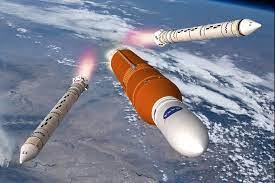The vehicle, known as the Space Launch System (SLS), is being taken to the pad at the Kennedy Space Center in Florida to conduct a dummy countdown.

This could happen in the next couple of months.
Ultimately, it’s hoped astronauts would climb aboard later SLS rockets to return to the Moon’s surface some time in the second half of this decade.

It will have the thrust to not only send astronauts far beyond Earth but additionally so much equipment and cargo that those crews could stay away for extended periods.
Thursday’s rollout from Kennedy’s Vehicle Assembly Building (VAB) is the rocket’s debut in the sense that it’s the very first time everyone has got to see all its different elements fully stacked together.
“The first rolling out of the VAB – that’s really an iconic moment for this vehicle,” said Tom Whitmeyer, Nasa’s associate administrator for exploration systems development. “To be here for a new generation of a super-heavy-lift, exploration-class vehicle is a day to remember.”

It is attached to a support gantry known as the Mobile Launcher. This structure, which is itself 120m high and weighs 5,000 tonnes, is sitting atop the same mammoth tractor that used to move the Saturn Vs back in the day, and later the space shuttles.
The Crawler Transporter goes very slowly, with a cruising speed of just over 1km/h (under 1mph), so it will take many hours to reach the pad, especially as engineers plan to stop and start the tractor to check everything is as it should be.
Once installed at pad 39B, the SLS will be prepared for a “wet dress rehearsal”, likely to occur on 3 April.
This will see the rocket loaded with propellants and taken through a practice countdown all the way to a mere 9.4 seconds before the moment of lift-off. The “scrub” point is just before they would normally light the four big shuttle-era engines under the rocket.

The end of May remains a possibility, but more likely it will be June or July.
This mission, under what Nasa terms its Artemis programme, will propel the rocket’s Orion crew capsule on a 26-day journey that includes an expanded orbit around the Moon. There will be no-one in the capsule for the test flight. This should happen on a second mission in a couple of years’ time.
While Nasa is developing the SLS, the American rocket entrepreneur Elon Musk is preparing an even larger vehicle at his R&D facility in Texas.
He calls his giant rocket the Starship. Like SLS it has yet to have a maiden flight. Unlike SLS, Starship has been designed to be totally reusable and ought therefore to be considerably cheaper to operate.
A recent assessment from the Office of Inspector General, which audits Nasa programmes, found that the first four SLS missions would each cost more than $4bn to execute – a sum of money that was described as unsustainable.




